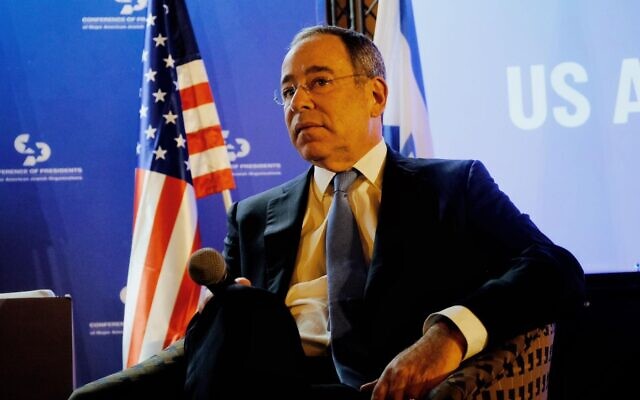‘Not alone in the driver’s seat’: US thinks Netanyahu has lost control of coalition
Biden officials tell ToI moves to expand settlements at the expense of normalization with Saudi Arabia prove far-right coalition partners are the ones steering government policy

WASHINGTON — In just about every one of the interviews Prime Minister Benjamin Netanyahu conducted with foreign press after he returned to power six months ago, the premier has had to answer how he would manage his far-right coalition partners.
“They joined me. I didn’t join them, and I direct policy,” Netanyahu told CNN in early February. “I’ve got my two hands on the wheel.”
US President Joe Biden’s administration initially appeared to accept the narrative and used it to explain why it was largely limiting its engagement with Jerusalem to the Prime Minister’s Office and not ministries headed by members of the ultra-nationalist Religious Zionism and Otzma Yehudit parties.
“The prime minister is the one who we’re dealing with… He told us he has his hands very firmly on the wheel,” US Ambassador to Israel Tom Nides said in a January interview.
But as emboldened settlers ramp up West Bank activity and Netanyahu’s government plows ahead with a plan to curb the High Court of Justice’s power, three Biden administration officials acknowledged this week to The Times of Israel that Washington is not convinced the longtime Likud leader is in control.
Just in the past few days, the government agreed to move ahead with its contentious judicial overhaul without the consensus support the premier insisted he would seek; violent settlers ransacked Palestinian villages throughout the West Bank largely unchecked; the Defense Ministry announced that it would advance construction plans for more than 4,500 settlement homes; and the cabinet passed a resolution giving Religious Zionism leader Bezalel Smotrich practically all control over planning approval for West Bank construction and dramatically expediting the process for expanding existing settlements.

The recent government moves have advanced with Likud’s backing, but some see that support as tepid, if not forced, noting that they undermine what Netanyahu says are his top policy goals.
“Bibi’s told us that he doesn’t even really care that much about judicial reform, and what he really wants is a [normalization] deal with Saudi Arabia and to prevent a nuclear Iran, but all these things indicate otherwise,” said a US official, who spoke on condition of anonymity.
“He’s told us he has his hands on the wheel, but he’s clearly not the only one in the driver’s seat,” the US official said.
Settlements over Saudi Arabia
Even as his grip on his government appears to loosen, Netanyahu continues to give interviews to foreign media outlets in an effort to demonstrate that he remains an influential player on the world stage.
Last week, Netanyahu spoke animatedly on Sky News about how a normalization agreement between Israel and Saudi Arabia would be “a quantum leap forward” and “would change history.”
Riyadh has made clear that most of its demands for an agreement are of Washington, as it seeks to boost its security partnership with the US. However, it has also stressed that no normalization deal with Israel will be finalized without a significant Palestinian-related component, a US official told The Times of Israel in May.
Two days after his Sky News interview though, the Netanyahu government announced plans to further expand Israeli presence in the West Bank, territory that the Palestinians hope will make up the bulk of their future state.
The US official acknowledged Tuesday that the settlement moves might not directly impact the Biden administration’s efforts to broker a normalization agreement between Israel and the Saudis. “But does the whole atmosphere get tainted by all the stuff? Absolutely,” they said.
“I would be singularly focused on doing absolutely nothing that would prevent the Saudi deal from getting done, but they haven’t been able to do that,” the US official lamented.
The US official recognized that the premier is constrained by domestic political concerns, but Washington is not giving him a pass. “This was the coalition he wanted,” they said.
And while Israeli security concerns hold water in the White House, “he loses us” when his response to terror attacks is to announce the building of more settlement homes, the second US official said.
“Unilateral actions such as this one — such as settlement advancement — will only incite tensions and undermine the prospect of a two-state solution,” State Department spokesperson Vedant Patel said Wednesday.

Netanyahu’s moves toward reconciliation with the Palestinians have also left officials less than impressed. In February, an agreement to temporarily halt planning on new settlements was swiftly downplayed by the prime minister, as he sought to assuage his right-wing base.
That same month, the premier’s office leaked a plan for a number of moves to bolster the PA’s finances and ease its tax burden. But despite a senior Israeli National Security Council official saying in April that the measures had received final approval, Israeli and Palestinian officials confirmed to The Times of Israel this week that most of the funds have yet to reach Ramallah.
“Even the most modest of steps promised to us have not materialized,” lamented a third US official.

Time for another strategy?
As Washington loses trust in Netanyahu’s ability to deliver, it may force the Biden administration to reckon with its decision to engage only with him and not the individuals who are pulling him to the right.
Smotrich is particularly relevant to US interests, given that the Finance Ministry he heads could play a major role in boosting the cash-strapped PA. For the past six months though, Smotrich has used the job to withhold tens of millions of dollars from Ramallah over welfare payments the latter makes to terrorists and their families.

His second position as a junior minister in the Defense Ministry in charge of settlement affairs is another one that overlaps with Washington’s attention.
Nides — who will be stepping down next month — has yet to meet with either Smotrich or Public Security Minister Itamar Ben Gvir, though he insists he isn’t boycotting anyone in the Israeli government.
Read more: Smotrich met with two prominent US Jewish leaders during boycotted March visit
The Herzog brothers — President Isaac and Israel’s Ambassador to the US Michael — have offered to set up a meeting between Nides and Smotrich, telling the US envoy that it could be an opportunity for him to influence the far-right minister, according to an Israeli source familiar with the matter.
The source explained that Smotrich would be in a much more difficult position to refuse a request from Nides if he had a relationship with him.

But Nides has avoided taking up the Herzogs on their offer, and the likelihood of a meeting plummeted after Smotrich called for the State of Israel to “wipe out” the Palestinian village of Huwara in March.
Engaging with such a controversial figure would have foreign policy implications for the Biden administration, but would also impact him domestically. The Democratic president still has to answer to his party’s progressive wing and would face tough questions from an American Jewish community that has largely stayed away from Smotrich.
The first US official was dismissive of the notion that working with Smotrich would pay dividends for the Biden administration, noting the Religious Zionism party leader’s ideological opposition to a two-state solution and history of remarks against Palestinians.
Instead, they expressed fears that meeting Smotrich would legitimize his views rather than moderate his actions.
There's no paywall on The Times of Israel, but the journalism we do is costly. As an independent news organization, we are in no way influenced by political or business interests. We rely on readers like you to support our fact-based coverage of Israel and the Jewish world. If you appreciate the integrity of this type of journalism, please join the ToI Community.

We’re really pleased that you’ve read X Times of Israel articles in the past month.
That’s why we started the Times of Israel eleven years ago - to provide discerning readers like you with must-read coverage of Israel and the Jewish world.
So now we have a request. Unlike other news outlets, we haven’t put up a paywall. But as the journalism we do is costly, we invite readers for whom The Times of Israel has become important to help support our work by joining The Times of Israel Community.
For as little as $6 a month you can help support our quality journalism while enjoying The Times of Israel AD-FREE, as well as accessing exclusive content available only to Times of Israel Community members.
Thank you,
David Horovitz, Founding Editor of The Times of Israel










